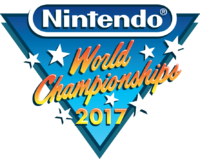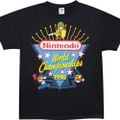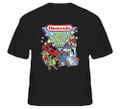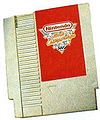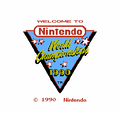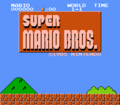Nintendo World Championships
- This article is about the contest. For the NES game based on the 1990 competition, see Nintendo World Championships 1990. For the Nintendo Switch game based on the contest as a whole, see Nintendo World Championships: NES Edition.
The Nintendo World Championships were a special nationwide promotion/contest held by Nintendo in 1990, 2015, and 2017.
List of events[edit]
1990[edit]
- Main article: Nintendo World Championships 1990
The NES cartridge serves as the primary competition in the 1990 Nintendo World Championship. The cartridge has a combination of Super Mario Bros., Rad Racer, and Tetris. The timer is set for six minutes and 21 seconds. The three games were modified for the competition, with Super Mario Bros. specifically being modified for the game to begin with 99 lives instead of just three.
1994[edit]
- Main article: Nintendo PowerFest '94
The SNES cartridge serves as the primary competition in Nintendo PowerFest '94 (also known as Nintendo World Championships II). The cartridge has a combination of Super Mario Bros.: The Lost Levels, Super Mario Kart, and Ken Griffey Jr. Presents Major League Baseball. The timer is set for six minutes.
2015[edit]
The competition returned for its 2015 edition on the weekend before E3 where sixteen competitors flew to Los Angeles to compete in the competition with the winner receiving the coveted trophy and a New Nintendo 3DS XL signed by Shigeru Miyamoto.
The qualifiers was set in eight Best Buy locations from different regions in the United States. Players play Championship Mode from Ultimate NES Remix (collect 50 coins in Super Mario Bros., collect 25 coins in Super Mario Bros. 3 and getting a possible high score in Dr. Mario). The eight top scorers from eight different regions compete in Los Angeles along with eight other players selected by Nintendo.
Each stage has a different game where the contestants compete for a spot in the next stage. The losing players face off in the elimination zone known as the Underground. There is a total of five stages and three Underground challenges. Only the third as well as the fifth of the final stages were of a Super Mario game.
- Stage 1: Splatoon - This stage is a standard Turf War battle. Two teams face off in a series of three battles. The first team to score two wins moves on to the next stage.
- Underground Challenge: The Legend of Zelda - This challenge is all about reaching the Triforce piece in the first dungeon. The first person to claim the piece moves on.
- Stage 2: Blast Ball - The second stage is based on a multiplayer mode in Metroid Prime: Federation Force. The first team to score three goals move on to the next stage.
- Underground Challenge: Super Metroid - This challenge allows the player to face off against Mother Brain and escaping the planet Zebes in three minutes. The first player to escape moves on to the third challenge.
- Stage 3: Mario Kart 8 - This stage is a VS. race across three tracks at 200cc. Only three move on to the next stage.
- Underground Challenge: Balloon Fight - This challenge allow the players to face off in Balloon Trip. Players have three minutes to get the highest score possible. After two rounds, the player with the most points move on to the fourth stage.
- Stage 4: Super Smash Bros. for Wii U - This stage is a standard six-minute free-for-all match. The two players with the most points after two matches face off in the final stage.
- Final Stage: Super Mario Maker - For this stage, two players face off in four custom-made courses made by the Treehouse. Players take turns to complete the first three courses. The contestant who completes the course in the fastest time or the furthest receive a fifteen-second head start in the final course. Then, both players face off in the final course and the first player to complete it wins the competition.
Super Mario Maker[edit]
In Super Mario Maker itself, unlocking all 56 of the 10 Mario Challenge's sample courses for the Coursebot unlocks the Nintendo World Championships 2015 courses for the player to play. Upon clearing all four of these courses, the player is rewarded with the ability to shake Super Mushrooms in the Super Mario Bros. game style in order to use the Weird Mushroom at any time.
2017[edit]
On August 8, 2017, Nintendo of America announced the return of the Nintendo World Championships to held on October 7, 2017 at the Manhattan Center's Grand Ballroom in New York City, New York.[1] Here, participants could play the demo versions of Super Mario Odyssey and Metroid: Samus Returns.
Qualifiers took place August 19, 2017 through September 10, 2017 at select Best Buy stores across eight cities in America. Contenders were split into two age groups consisting of 12 years old and younger and 13 years old and older and play Mario Kart 7. Ages 12 years old and younger played as Mario on DS Luigi's Mansion with the Standard Kart, Standard Wheels, and Super Glider. Ages 13 years old and older played as Bowser on GBA Bowser Castle 1 also using a Standard Kart, Standard Wheels, and Super Glider. Players with the best Time Trial out of two attempts in each age group after each two-day event at each Best Buy location qualified for the Nintendo World Championships 2017. Players were either forced to forfeit or advanced their way through the tournament based on their performance.
Like the previous competition, each stage has a different game (with the exception of the first stage and finals, having more than one game) where the contestants compete for a spot in the next stage. The losing players will face off in the elimination zone known as the Underground. There is a total of seven stages and five Underground challenges, with the first stage including three games and the finals with two, bringing a overall total of 15 games in the competition.
- Stage 1: The first stage has three different games for the players to play through and rank up points. The top 16 players with the most points in total after all three games advance to the next stage. Players are ranked based on how well they performed for each game, with points being earned based on rank (i.e. 1st place = 24 points, 24th place = 1 point) or in the third game's case, based on completion time (24 points if the sequence is completed under three minutes, 12 points if completed under six minutes, 0 points if they do not completed it)
- Game 1: The Legend of Zelda: Breath of the Wild - In the first game of the stage, players play though the Shield-Surfing mini-game in the Advanced Course at Selmie's Spot. Players have three minutes to get the fastest time possible.
- Game 2: Super Smash Bros. for Wii U - For the second game of the stage, players compete in Home-Run Contest and try hit the Sandbag as far as possible. Each player only get two attempts.
- Game 3: Metroid: Samus Returns - The third game of the stage have players encounter the Diggernaut to which they have to escape from, they have only six minutes to finish the sequence.
- Underground Challenge: Balloon Fight - This challenge have the players face off in Balloon Trip, they have three minutes to get the highest score they can. The two players with the most points move on.
- Stage 2: Super Smash Bros. for Wii U - The second stage is a standard six-minute 8-player match of two, where the 16 players are divided into two groups of eight for each match to battle it out. The top six players in each of the two matches (with a total of 12 players) head on to the next stage.
- Underground Challenge: Bird & Beans - In this challenge, players have get the highest score they can in three minutes. Only two with the highest scores move on.
- Stage 3: Mario Kart 8 Deluxe - This stage is a VS. race across Mount Wario at 50cc and Electrodrome at 200cc. The eight players with the most points combined across both races advance to the next stage.
- Underground Challenge: Donkey Kong Country Returns - This challenge is about completing the level, Bombs Away in the fastest time possible with a time limit of six minutes. The first two players with the fastest times move on.
- Stage 4: Splatoon 2 - This stage is a Tower Control battle in Snapper Canal. The eight players are split into two teams, to face off in a set of three battles. The first team to get two wins head on to the next stage.
- Underground Challenge: Tetris - This challenge have players attempt the highest score they can in three minutes. Two players with the highest scores move on.
- Stage 5: ARMS - This stage is a Arena mode, 1-on-1 match of two. Two each of the four players compete each other, needing to win two rounds in order to win one game. One of two players in each match to win a set of two games head on to the finals.
- Underground Challenge: Mario Party 2 - For this challenge, four players compete each other in three rounds for each of the three minigames: Bumper Balls, Hexagon Heat, and Shell Shocked. The player with the highest score total joins the other two finalists in the finals.
- Finals:
- Game 1: Super Mario Maker - In this game, the three finalists play through a custom-made course made by the Treehouse. The first one to complete the course head on to the championship.
- Game 2: Super Mario Bros. Deluxe - For this next game, the two remaining players face off in a VS game. The first to win five levels faces off the other finalist in the championship game.
- Championship Game: Super Mario Odyssey - For this final game, the last two players compete in a part of three challenges. The first two challenges have both players compete against each other to reach the Power Moon first. The first player to get the Power Moon receive a five-second head start in the final challenge. Then, both of the players face off in the final challenge where they would have to complete the level and face against the boss. The first one to defeat the boss wins the competition.
Nintendo World Championships: NES Edition[edit]
- Main article: Nintendo World Championships: NES Edition
On May 8, 2024, a home video game version of the Nintendo World Championships as a whole titled Nintendo World Championships: NES Edition was released on the Nintendo Switch on July 18, 2024. The game was revealed in a trailer featuring past winners and competitors of the Nintendo World Championships.[2]
Gallery[edit]
Promotional flyer for the 1990 event, featuring Mario
Nintendo Power contest gold cartridge prize
Super Mario Bros. title screen in the 1990 cartridge
See also[edit]
References[edit]
- ^ https://www.nintendo.com/whatsnew/detail/the-nintendo-world-championships-are-returning-this-october
- ^ Nintendo of America (May 8, 2024). Nintendo World Championships: NES Edition — Announcement Trailer — Nintendo Switch. YouTube. Retrieved May 8, 2024.
